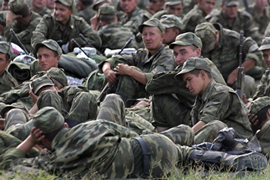Russia angry over US missile shield
Moscow warns Poland that deal to host US defence system will make it a target.

General Anatoly Nogovitsyn, deputy head of Russia’s general staff, warned that Poland was making itself a target for Russia’s military “100 per cent” by hosting the defence system.
“It becomes a target for attack. Such targets are destroyed as a first priority,” Nogovitsyn said.
Poland agreed on Thursday to host elements of the US global anti-missile system after Washington agreed to boost Poland’s own air defences.
On Friday, Radek Sikorski, the Polish foreign minister, said that Poland was open to Russian inspections of the shield because it wanted to give Moscow “tangible proof” that the planned bases were not directed against Russia.
Washington says the missile system is aimed at protecting the US and its allies from long-range missiles that could be fired by what it terms “rogue states”, including Iran.
Moscow has long opposed the system, other parts of which are due to be stationed in the Czech Republic.
Georgia crisis
Moscow and Washington have been trading barbs over Georgia, a key US ally in the region, after Russian troops routed Georgian forces as they tried to take back control of South Ossetia, a Georgian separatist region backed by Moscow.
Russian units then went into several towns in Georgian territory, provoking US officials to invoke memories of the Soviet Union’s occupation of Eastern Europe during the Cold War.
Rogozin criticised the US for failing to support Russia in the Georgia crisis and said relations could be harmed.
He said: “I consider that the United States is not acting in a cautious manner in this situation.
 |
| Russian troops routed Georgian forces in South Ossetia [Reuters] |
“Instead of getting full moral and political support in the struggle against real aggression and ethnic cleansing, we have heard a mass of unpleasant words and threats. That will, of course, not strengthen our relations.”
Some Polish analysts have argued that it was images of the conflict in Georgia that push Warsaw to agree to the shield deal after months of talks.
They also said it risked putting more pressure on ties with Russia just months after Donald Tusk, the Polish prime minister, vowed to improve his country’s historically strained relations with its powerful neighbour.
Kazimierz Kik, a sociology professor at Poland’s Swietokrzyska Academy, said: “It can now be expected that this will be the beginning of the end of Polish-Russian talks. This agreement can be seen as a purely anti-Russian agreement.
It’s making Poland part of the US defence system and, in my view, pushes Poland along a well-worn road of mistakes – looking for allies afar and enemies nearby.”